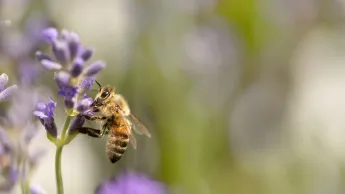Little helpers, great impact – bees are indispensable
- 2024-11-22
- Gemma Pörzgen
- Comment

Bees are affected by climate change and pesticides. In a Virtual Coffee Break, Dr. Kirsten Traynor spoke about the role these animals play in our ecosystem and about how we can protect them.
They are about one to one and a half centimetres long and have a hairy body with yellow and black stripes. Their eyes are large and faceted and they have string-like antennas. Their transparent wings flap rapidly and allow for precise flight. Most people think of honeybees, when they think about bees. However, there are more than 20,000 types of bees in the world.
The bee expert Dr. Kirsten Traynor, Director of the at Hohenheim University in Stuttgart, concerns herself with this great diversity. During the on the Alumniportal, the researcher presented some colourful specimen in deep red and brilliant blue. There are surprising differences when it comes to the insects’ size, too. What they have in common, Traynor reported, is that more and more bees are dying around the world, due to the use of pesticides, bee colonies falling ill, the and the . The researcher believes that synergies of those different threats are the greatest problem, as these can lead to a snowball effect. “Honeybees suffered a massive collapse in 2006/2007,” Traynor said. She made it clear that there are numerous other insect species that are equally threatened.
Endangered bees – a global problem
It may come as a surprise that the number of bee species has actually increased in Germany in recent years due to climate change, as numerous bees are leaving countries in the south to settle in Central Europe, owing to . Traynor pointed out that this was evidence of how adaptable bees are. Nevertheless, about half of the bees in the Federal Republic are on the red list of endangered species.
Bees have played an important role for human beings for thousands of years, not least because of their sweet honey. Looking back in history, bees showed up in cave painting early on. The researcher Kirsten Traynor showed a few impressive depictions of people surrounded by bees and their bees’ nests that were created some 8,000 years ago.
Key role for our ecosystem
“We need bees for pollination and plants need a partner,” said Traynor, explaining the role the species plays for human beings. The nectar from blossoms is a source of energy for bees, and the collected pollen supplies them with protein. “Bees are incredibly important,” the researcher said. 75 percent of the food produced worldwide depends on the pollination services of insects. Without insects most of our vegetable and fruit varieties would disappear. This is why insect pollination is considered to be worth billions in economic calculations.
Traynor pointed out that everyone can do something to contribute to preserving the diversity of bees, also in future. She encouraged people to plant flowers in their garden or on their balcony that will offer nectar and pollen for bees. A wooden bee hotel that is attached to a house wall can also make a small difference.
